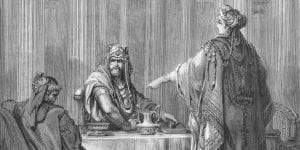
The Jewish holiday of Purim, based on the events in the book of Esther, begins this year at sunset on March 20th. Though the story of the book of Esther is a powerful one, the book has been controversial in church history. Some have suggested it should not be a part of Scriptures since it doesn’t mention the name of God! You read that correctly…the name of God is not mentioned anywhere in the book of Esther, but His work is evident throughout.
The Book of Esther is important to us specifically because His name is not mentioned. There are many times in our lives, no matter how faithful we are or how strong our faith is, when we encounter impossible circumstances and when we cry out to God all we hear are crickets. He seems to be absent, gone.
Esther tells the story of Jewish people still in the Persian Empire after the Babylonian captivity, a time where God had disciplined them because of their spiritual unfaithfulness. Through the unfolding of the story, we see two sets of circumstances playing out. First, we see the Jewish girl Hadassah (Esther) being thrust into the position of Queen through a chain of seemingly impossible coincidences. In the midst of this process, she hides her Jewish identity.
Second, we see the king’s second in command (Haman) because of a personal grudge with Esther’s relative Mordecai seek to destroy all the Jewish people in the kingdom.
Three truths
There are three truths that come to bear that apply powerfully to our lives as we consider this Biblical account. The story of Esther reminds us that even though God seems absent, He still remains faithful to His promises. In Genesis 12, God promises Abraham that He would bless those who bless him (and his descendants) and curse those who curse him. In seeking to destroy the Jewish people, Haman put himself at odds with God and His promises, so God worked through circumstances to bring the curse back on Haman’s head. Though he sought to destroy them at the end of the story, he was killed in the same way he sought to kill Mordecai!
The book of Esther also challenges us to act based upon what we know about God even though we cannot see what God will do. This was evident when the whole plot to kill the Jewish people was exposed and Mordecai passed on the bad news to Esther. In chapter four Mordecai challenges Esther to act: “Do not imagine that you in the king’s palace can escape any more than all the Jews. For if you remain silent at this time, relief and deliverance will arise for the Jews from another place, and you and your father’s house will perish. And who knows whether you have not attained royalty for such a time as this?”
Finally, we see a challenge to encourage one another when God seems absent. When Mordecai finds out about the plot to kill his people, he falls into despair and mourning, but Esther encourages him to stop mourning and later to fast (and pray) with the rest of the people. When Esther is fearful of approaching the King unsummoned (potentially a death sentence), Mordecai challenges her to step out in faith.
He is faithful
When we encounter impossible circumstances and God seems absent, let us understand that if we have come to know the God of Abraham, Isaac and Jacob through Jesus the Jewish Messiah, God will prove Himself faithful to us. Let us also live by faith even though it seems like it will cause more problems than help! Then let us also encourage one another, pointing one another in our despair and fear to the God who may be silent at times but is always faithful!
Let me end by saying two things: First, although we as Christians can apply these truths to our circumstances God is still faithful to His covenants and promises to Israel as a nation. Second, although God is still faithful to his promises to Israel as a nation, they still need to hear and respond to the message of the Gospel. In John 14:6 the Jewish Messiah speaking to His Jewish disciples said “I am the way, and the truth, and the life; no one comes to the Father but through Me.”
Jim Fox is a ministry representative of Chosen People Ministries, an international ministry reaching out to the Jewish community with the Gospel and teaching the Church to do the same. Jim has close to 30 years of ministry experience through his work with Chosen People Ministries and as a pastor.

Comments